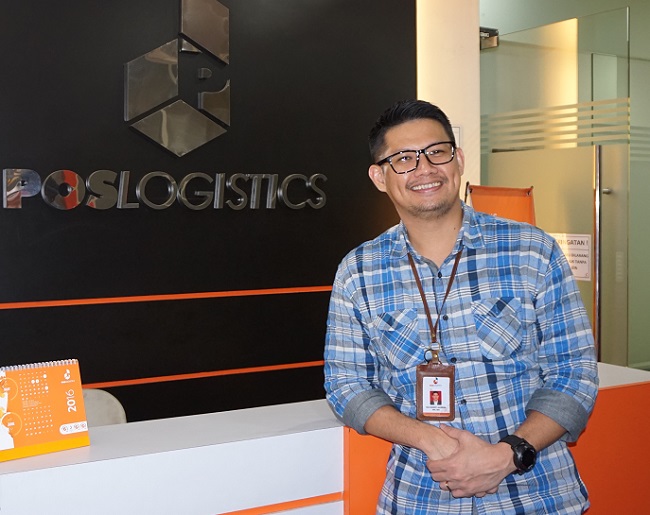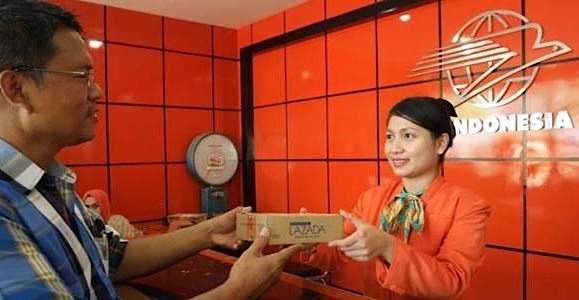Pos Logistics’ digital transformation: You will not believe some of its issues
By Masyitha Baziad July 13, 2016
- Transformation to be completed by 2019, in time for 2020 IPO
- First milestone was getting staffers to properly use … email!

IT is unusual to walk into a state-owned enterprise (SOE) – the equivalent of a government-linked company or GLC in countries like Malaysia – and see the person in charge decked out in jeans and sneakers.
“No need to worry – I have my orange uniform, and formal batik shirts and slacks inside the tiny cupboard behind you, in case I have to attend a meeting with government officials,” Yan Hendry Jauwena (pic above) assures Digital News Asia (DNA) at his office in Jakarta.
Yan is chief executive officer of PT Pos Logistics Indonesia, the logistics arm of Indonesia’s PT Pos Indonesia, the SOE that handles postal services in the country.
As one of the oldest firms in the country – with its roots stretching back to the Dutch colonial era – Pos Indonesia has been struggling to keep up with the Internet era, in which few people send ‘snailmail’ letters.
But it is now is ready to transform itself into a technology-based logistics solutions provider through Pos Logistics, aiming to support the country’s e-commerce boom.
Yan, with 15 years of logistics experience including with Germany’s Deutsche Post DHL and the United Kingdom’s Ceva Logistics, has been tasked – and entrusted – with leading Pos Logistics’ digital transformation.
That transformation is also key to boosting Pos Logistics’ profile for an initial public offering (IPO) scheduled for 2020.
Yan is targeting for Pos Logistics’ digital transformation to be completed before it begins its IPO tour and roadshows in 2019.
READ ALSO: BYOD still in ‘emergent’ phase, get with it, you guys
The Pos Indonesia edge

In November 2015, Indonesia’s Minister of State-Owned Enterprises Rini Soemarno made a surprising move by appointing Gilarsi Wahyu Setijono – a non-government executive with a background in the fashion, investment, and electronics industries – to lead Pos Indonesia.
For Yan, the appointment is an important one for Pos Indonesia’s relevance and future, as it gives the archaic SOE a much-needed private-sector touch.
As its subsidiary, Pos Logistics now has the flexibility of a private sector company, but with support from SOEs.
More importantly, Gilarsi has made it clear that the logistics arm will lead the digital transformation of Pos Indonesia, according to Yan.
“Pos Logistics needs to be at the forefront of our parent company’s business, and leverage on the e-commerce boom in the country,” he says.
This is helped by the fact that Pos Indonesia has 4,500 post offices, with 35,000 agents, spread across the archipelago.
“Pos Indonesia has networks even in the most remote areas of Indonesia. That is a huge advantage; there is no logistics company with that many networks,” says Yan.
“Our networks can really support the e-commerce industry both in terms of logistics and as payment points – however, we are focusing on the logistics side first,” he adds.
According to a study by the Indonesian Logistics Association (ALI) and research firm Frost & Sullivan, Indonesia’s domestic logistics industry had a market size of Rp2.15 quadrillion (US$163.4 billion) last year, and is expected to grow by 10-12% this year.
“As a subsidiary of an SOE, Pos Logistics has access to about 119 SOEs – of which 60% are in production sectors where distribution is a key part of their operations,” says Yan.
These SOEs spend up to Rp240 trillion (US$18.3 billion) in logistics every year, or about 11.2% of the whole logistics potential in the country as forecast by Frost & Sullivan, he notes.
“If we can even take just 10% of the amount spent by these SOEs – or about Rp24 trillion (US$1.8 billion) – we will definitely become the largest logistics company in Indonesia.
“No other logistics company, even the multinationals, has a market that big,” he declares.
First transformation: Simple email
But all these plans would have come to naught if Yan could not get Pos Logistics’ employees on board the digital journey.
The 35-year-old started with Pos Logistics a little more than a year ago, first as business and solutions director before being promoted to the CEO role in February.
“At the time I joined, nobody used the company’s email – people were still communicating through letters that you would only read three days after they were written,” he says.
“Coming from the private sector, I was used to reading emails first thing in the morning right up till before I go to bed. My first three months here, I barely had 10 emails in my mailbox each day,” he recalls.
With the authority bestowed upon him by the parent company, Yan issued a new set of rules for Pos Logistics, which included using the corporate email service for official communications.
“You know what happened then? People would scan their letters and send them as email attachments!
“Given the small bandwidth allocated to email, it was a disaster,” he says, adding that the company has since increased the mailbox allocation, and the corporate email service has been working out well.
For Yan, changing the basic behaviour of the organisation’s people via their email use was an important milestone in its digital transformation.
Indeed, Pos Logistics employees have now ‘levelled up’ and use file-hosting service Dropbox on a daily basis, and communicate with cloud-based team collaboration software Slack.
Next: Departmental technology
To be able to serve e-commerce and large fast-moving consumer goods (FMCG) clients, Pos Logistics needed to have its own technology solutions and more comprehensive data that could help in developing faster and more accurate services.
This is why earlier this year it inked a deal with Singapore’s Anchanto for its warehousing and inventory technology.
Now Pos Logistics is aiming to deploy specialised technology at every department, and then integrate all these departments with cloud-based software that can deliver real-time analytics and reports to the directors.
Yan divides Pos Logistics’ business departments into four: Sales and marketing; operations; finance; and human resources.
Currently, the sales and marketing department is served by US-based enterprise cloud platform Salesforce.com; while the operations part is supported by a local software company called G5.
The finance department has yet to decide on its own technology, while the human resources department is now in a tender process to look for a technology solutions provider.
“Yes, each department is still operating in a silo – they are not integrated yet, but this will soon change and we are working to integrate our whole system,” says Yan.
“The goal is to have good internal systems with compatible infrastructure and hardware, and which can communicate seamlessly with many other systems,” he adds.
To achieve this, Pos Logistics has hired a team of expatriates to accelerate the company’s digital transformation – these experts are handling the ICT infrastructure, network, and systems integration.
Acquiring tech startups
 Pos Logistics’ digital transformation and ambition to lead the logistics sector in Indonesia -- and ultimately the region – go beyond the internal deployment of technology.
Pos Logistics’ digital transformation and ambition to lead the logistics sector in Indonesia -- and ultimately the region – go beyond the internal deployment of technology.
To shore up its digital capabilities, the company is planning to acquire three startups this year, one each in the mobile app, big data analytics, and enterprise solutions space.
“Currently we are in the due diligent phase, including determining the startups’ value, but announcements should be out by the end of the third quarter of this year,” says Yan (pic).
“We do not invest in fresh-from-the-oven startups – these three tech startups have been in the market for several years; they have good track records but need to scale and grow their business,” he adds.
Pos Indonesia will have a 90% of stake in each of these three startups, while the founders would hold on to the remaining 10%.
The initial reason for acquiring these startups was to ensure Pos Logistics would have all the technology it needed to accelerate its business and better serve the e-commerce sector, but it is now looking make these three startups subsidiaries that can also provide solutions to other companies, including Pos Logistics’ own clients.
All of these efforts are a fundamental part of the IPO pipeline, he says.
“When the technology deployment is completed in 2017, we can start to create more added value in 2018 and 2019, and by the year of the IPO, we would have all we need to make a more attractive offer to investors,” he adds.
Related Stories:
Singapore’s Anchanto in MoU with Pos Logistik Indonesia
HK’s OpenPort wants to fix Indonesia’s archaic logistics sector
Logistics and payments holding back SEA e-commerce boom: Bain report
SingPost revenue grows 24%+ on back of digital initiative
For more technology news and the latest updates, follow us on Twitter, LinkedIn or Like us on Facebook.


